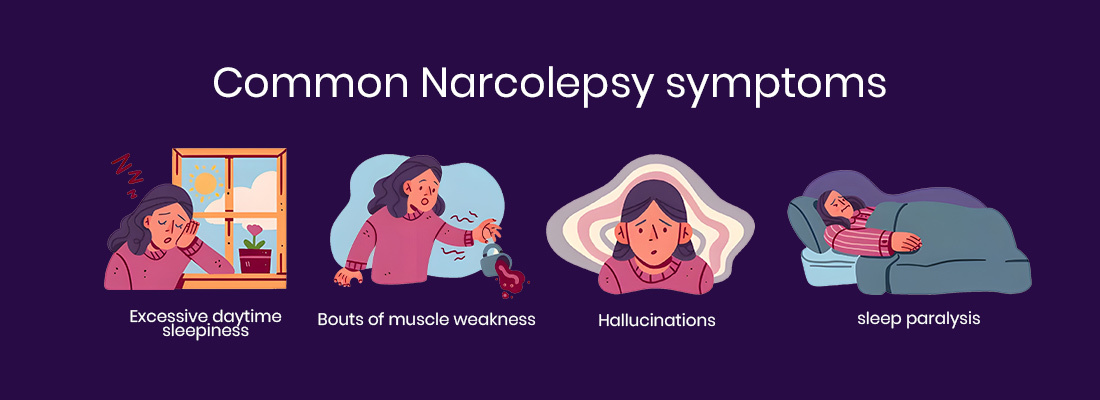Introduction
Is narcolepsy genetic?
One-word answer: Yes!
However, we cannot determine this answer based on one condition; we need several conditions to analyze.
But what are the conditions? Let’s analyze them in this blog.
Is Narcolepsy Genetic? Is Narcolepsy Hereditary?
Narcolepsy is a neurological disorder that causes daytime sleepiness. Narcolepsy can also induce muscle weakness, making it difficult to have deep or comfortable sleep. You might be surprised, but research says that 1 in 2000 people get affected by narcolepsy.
While much remains unknown regarding the origin of narcolepsy, researchers believe there is a hereditary component in some cases. In simple words, there is no exact cause determined for narcolepsy. However, there are a range of potential causes, including genetics.
Do you want to know about another common sleep disorder, insomnia? Click here to read.
Genetic Basis
Let’s get insights into the answer to the question: is narcolepsy genetic?
Experts believe there is a hereditary component to type 1 narcolepsy (NT1), which characterizes cataplexy or muscle weakness.
While genes are not directly responsible, most people with NT1 have a human leukocyte antigen (HLA) gene. People with NT1 have decreased levels of hypocretin in their brains. This protein regulates sleep patterns, and low levels lead to NT1.
Additionally, the HLA gene, which might be present in 95% of persons with NT1, may raise the risk of immune system problems, resulting in a hypocretin deficit.
While talking about narcolepsy type 2, we know less about the genetic basis.
Is Narcolepsy Genetic-Other Causes of Narcolepsy
When discussing factors other than genetics, the root cause is still unidentified. Most often, narcolepsy occurs in patients with no prior family history.
There are a variety of stimuli that can cause low hypocretin levels in individuals with NT1.
Narcolepsy triggers may include the following:
- Stress and Trauma
- Autoimmune issues
- Infection and exposure to toxins.
- Menopause and puberty are examples of hormonal changes.
Therefore, it means genetics is not the stand-alone factor for narcolepsy, but there may be multiple factors behind it.
You may want to know: is narcolepsy a disability?
Narcolepsy-Symptoms

After we have answered the question: is narcolepsy genetic? Let’s get some insights into the disease’s symptoms.
The main symptom of narcolepsy is excessive daytime sleepiness. Even if patients receive enough sleep, people with narcolepsy may suffer excessive tiredness at various intervals during the day. Moreover, it can cause “sleep attacks,” where individuals fall asleep unexpectedly, potentially at harmful or inappropriate times.
Other symptoms include:
- Cataplexy includes recurrent bouts of sudden and temporary loss of muscular control. Persons with narcolepsy type 1 mostly exhibit this symptom.
- Sleep paralysis: Approximately 25% of patients with narcolepsy experience bouts in which they are unable to move their limbs despite being consciously awake. Sleep paralysis occurs immediately after awakening or going to sleep.
- People with narcolepsy may experience visual or aural hallucinations, either falling asleep or awakening.
- Disrupted evening sleep: People with narcolepsy might experience fitful sleep associated with unusual or unpleasant dreams.
Ps: Do you want to know about sudden excessive sleepiness? Give this blog a read.
Diagnosis of Narcolepsy
After we have known the answer to the question: is narcolepsy genetic? Let’s move on to its diagnosis.
Is there a diagnosis method present, or is it still under study?
Physicians can diagnose narcolepsy after examining the findings of specialized sleep testing, such as an overnight sleep study and the Multiple Sleep Latency Test (MSLT).
Sensors are utilized in these examinations to monitor brain waves, muscle activity, and breathing. This assessment enables the discovery of REM sleep problems associated with narcolepsy. These tests can also determine how soon a person falls asleep, which is called sleep latency.
Sleep testing can help to decrease other causes of excessive tiredness, such as sleep disorders. Moreover, physicians may recommend imaging studies to ensure there is no damage to the brain causing the symptoms.
Narcolepsy-Treatment
As we now know, the answer to the question is narcolepsy genetic. Let’s sneak into its treatment.
Medications, lifestyle adjustments, and other factors contribute to providing treatment.
Furthermore, talking about medications, physicians use a range of options:
Alerting agents
These medications include armodafinil (Nuvigil), modafinil (Provigil), and methylphenidate (Ritalin). They may boost alertness.
Although side effects are rare, they can include nausea, headaches, and anxiety. Some patients may get severe rashes after taking armodafinil (Nuvigil) or modafinil (Provigil).
Serotonin-norepinephrine reuptake inhibitors (SNRIs)
SNRIs, including venlafaxine (Effexor), can aid with cataplexy, hallucinations, and sleep paralysis. Side effects may include digestive issues, sleeplessness, and weight gain.
Selective serotonin reuptake inhibitors (SSRIs)
SSRIs, like fluoxetine (Prozac), can also help you sleep better and feel happier. However, common adverse effects include lightheadedness and dry mouth.
Tricyclic antidepressants
Amitriptyline and nortriptyline are two examples of tricyclic antidepressants.
They may alleviate cataplexy, sleep paralysis, and hallucinations. These older drugs might cause unpleasant side effects such as constipation, dry mouth, and urine retention. They may exacerbate daytime sleepiness.
Lifestyle Changes
As we now know the answer to the question is narcolepsy genetic, let’s move further into its treatment options.
In addition to medicine, several lifestyle adjustments can help alleviate symptoms and boost the support you receive from friends, family, and institutions.
- Inform your teachers and friends of your condition if you fall asleep at school or work.
- Be warned that some narcolepsy treatments will lead you to test positive for stimulants on drug screenings at work. To avoid misunderstandings, communicate with your employer ahead of time.
- Avoid eating a large meal before bedtime, as this can cause difficulty in sleeping.
- Try taking 10- to 20-minute naps following meals.
- Do whatever you can to maintain a consistent sleep/wake routine.
- Avoid nicotine and alcohol, as they might enhance symptoms.
Risk Factors for Narcolepsy
Some things that might make you more likely to have narcolepsy are:
- If someone in your family, like a parent or sibling, has narcolepsy, you could be more likely to have it. But this doesn’t happen in a lot of families.
- Narcolepsy is less common in people around 15 years old and around 36 years old.
- Sometimes, if someone has had a bad injury to their brain, it might lead to narcolepsy. It isn’t common, but it can happen after severe brain injuries or if there’s a tumor in the brain that affects how awake you are and your REM sleep.
Future Directions for Narcolepsy Research
Advances in genetics, neurology, and immunology have propelled continuous research to understand the complex systems behind narcolepsy. Whole-genome sequencing and CRISPR/Cas9 gene editing are emerging technologies that have proved promising for identifying novel genetic targets and producing more effective narcolepsy therapeutics.
In addition to genetic research, investigations on the involvement of immunological dysfunction, neuroinflammation, and neuronal circuitry in narcolepsy pathophysiology are now underway. Additionally, collaboration between researchers, doctors, and patient advocacy groups is critical for furthering our understanding of narcolepsy and developing tailored methods for diagnosis and treatment.
Conclusion
To conclude, narcolepsy is a multifactorial disease. Genetic, environmental, and lifestyle factors may contribute to its onset. However, the question is, is narcolepsy genetic? The answer to this question is partial Yes, as genetics is not the only contributing factor. Advances in genetics and neuroscience have provided valuable insights into the pathophysiology of narcolepsy and have paved the way for targeted therapies and personalized treatment approaches.
After knowing the answer to the question is narcolepsy hereditary, you may self-diagnose if it is present in you. If the answer is affirmative, contact Home Sleep Centre today. With a team of experts and at-home testing services, narcolepsy diagnosis is not far off. At Home Sleep Center, we understand the importance of healthy sleep and are here to help you accomplish it without leaving the comfort of your home. Our novel strategy connects you with recognized Online Sleep Medicine Specialists via virtual meetings and courteous phone calls.


